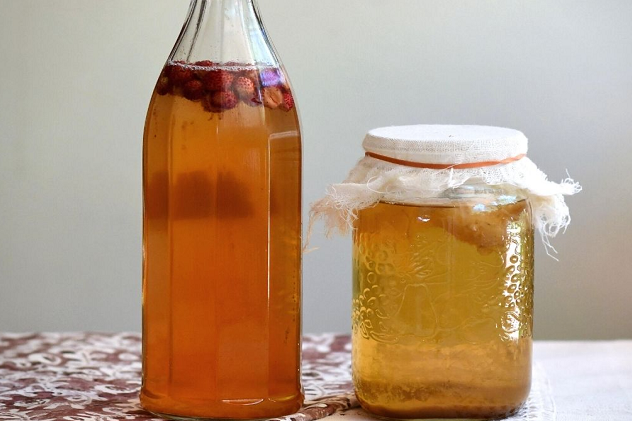Kombucha, the effervescent fermented tea, has surged in popularity for its potential health perks. Originating in ancient China but gaining modern fame since the mid-90s, this “elixir of life” boasts a global market set to hit $5.8 billion by 2027. What exactly makes kombucha so intriguing?
What is Kombucha?
Kombucha starts with brewed tea, sweetened with sugar or fruit juice, and fermented with a symbiotic culture of bacteria and yeast (SCOBY). This microbial dance transforms the mixture over 1-3 weeks, resulting in a tangy, slightly sweet beverage akin to a fizzy soda.

Probiotic Powerhouse
Central to kombucha’s allure is its probiotic content, akin to yogurt or kimchi. Probiotics are renowned for nurturing our gut microbiome, crucial for digestive health and immunity. However, the exact benefits, especially from kombucha, remain a topic of ongoing research.
Health Claims vs. Reality
Enthusiasts credit kombucha with myriad benefits—from boosting energy to alleviating inflammation. Yet, scientific evidence validating these claims is mixed. While some studies suggest potential benefits for specific conditions like irritable bowel syndrome, the variability in kombucha’s formulation complicates broader assertions.
Navigating Probiotic Claims
Labels often tout high CFU (colony forming units) counts, indicating live bacteria. However, these counts can dwindle over time, raising questions about the actual probiotic benefits upon consumption. Refrigeration can help preserve probiotics, although pasteurization—a process some brands use—can diminish these live cultures.

Conclusion
While kombucha holds promise as a probiotic-rich beverage potentially beneficial for gut health and beyond, consumers should approach its health claims with informed skepticism. Choosing reputable brands, understanding probiotic viability, and considering personal health needs are key when integrating kombucha into your diet.
In essence, kombucha remains a tantalizing option for health-conscious individuals, offering a flavorful alternative to traditional probiotic sources. As research evolves, so too will our understanding of its true health impacts.
